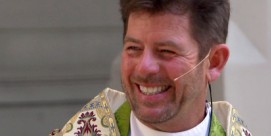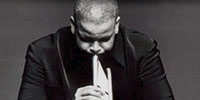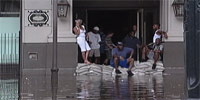TERENCE BLANCHARD: Ten years after the hurricane there’s a lot of great things that have been going on in the city of New Orleans. But at the same time it’s hard to rebuild a city, and we have a long way to go. You know, we have a lot of work to do.
You know, my mom lives in the Ninth Ward, and when I drive through that neighborhood it’s hard to see, because it’s not the same. You know, there are people that are living there, there are people that have come back home, but you can tell people are still struggling from the effects of the hurricane. It is hard to watch, but it’s the reality of our life, and the good side of it is is that a lot of people are moving forward and trying to find some positive things in their life.
One of the things that have kept us all together is our faith. You know, I was amazed that, you know, my mom, you know, in the aftermath of the hurricane, when we found her, and we brought her to LA we put her in our own apartment for like a couple of months. The thing that was amazing was to watch her and her church members have like fellowship over the phone. You know, that was like an amazing thing to see, and that faith has kept people strong throughout all of this.
People started to realize we only have each other, we only have family, we only have our communities, we only have our faith. Those are the things that keep us moving forward and keep us strong. That was a huge lesson for us to learn, and thankfully, you know, there are a number of people who still believe that and are still holding on to that.
Looking at the news every day and looking at what was happening between our youth and law enforcement in this country, I could not ignore what was happening. There is a disconnect that has been going on in our community. And you know, it’s the reason why the term has been coined: Black Lives Matter. It’s been a frustrating thing to witness.
The tune “Breathless,” you know, it was inspired by the incident with Eric Garner. I mean it’s kind of hard to believe that someone would lose their life, you know, for selling cigarettes on the street. You know it’s kind of hard to believe that in the midst of someone screaming over and over, “I can’t breathe” that there wouldn’t be enough sensitivity for somebody to recognize what was going on.
We don’t need to discuss this anymore, there’s no need for discussions about police brutality or racism. We understand that that exists; it’s been happening for generations. The only way this is going to stop is when these guys are being held responsible for their actions, when guys go to jail, when guys pay the penalties for doing something against, or breaking the law. You know, that’s the only way this is going stop.
There’s just pure exhaustion, pure exhaustion. That’s the only way I could really explain it, you know?
You know, I’ve been a Buddhist for a number of years, and I chant every day, and one of the things that I strongly believe in is that moment of silence, of reflection, for everybody to sit down and be still for a second.
In the midst of this time that we’re living in, I guess, so to speak, it’s amazing to see so many people who respond to the notion of meditation.
I was, you know, brought into this business by Art Blakey and his group was called Art Blakey and the Jazz Messengers. He always used to say “from the creator to the artist, directly to the audience in split-second timing.” That was his thing he used to say, every show. But I believe that.
Music is that communal thing to bring us together to have a shared experience, to kind of expand our thinking, our spirituality, and our horizons.
There are times that we perform when we don’t feel like it’s us. There are times when we perform where we are spectators like the people who are watching us, and that’s when you start to realize there’s something much more powerful than us at play, there’s something else going on, you know, and the key thing as artists is to recognize it and allow it to do what it’s supposed to do, and not have your ego say, oh, but I know this is cool or I know this is hip. No. Delve into the unknown and allow yourself to be used.
There’s a collective vibration of souls that need to speak and need to be heard, and I think for me as an artist I have to allow myself to listen to that and be moved by that and be guided by that.
A big part of our responsibility is allowing ourselves to listen, you know. Take what we’ve studied, take all of our training, and throw it away, because it will be there in the end.





